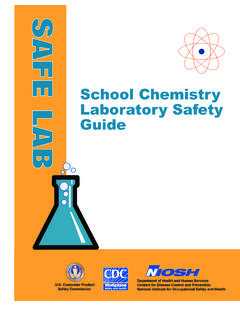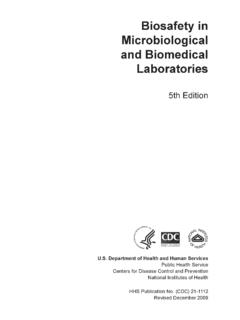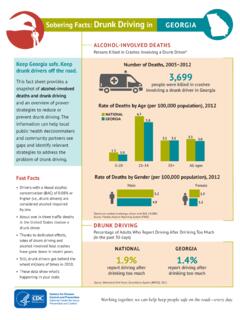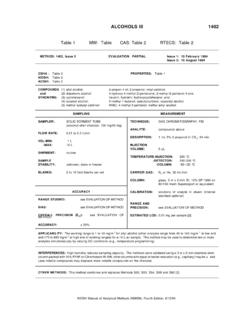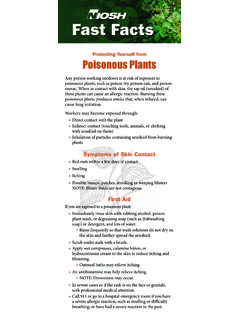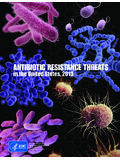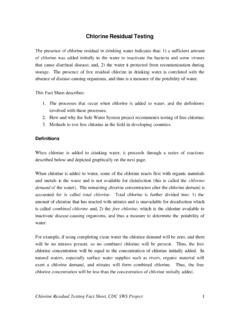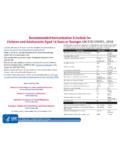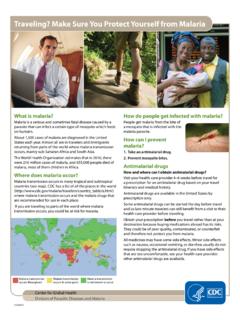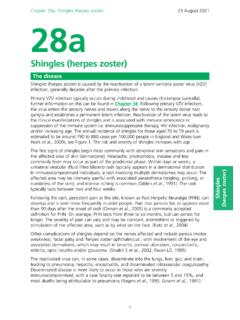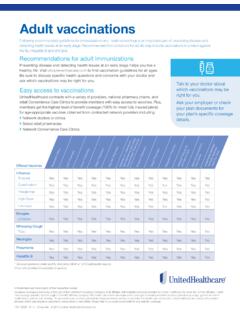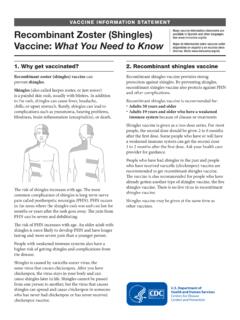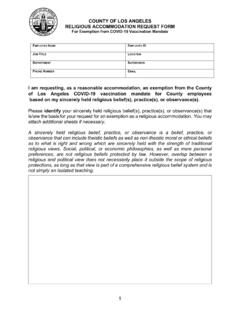Transcription of Vaccine Information Statement: mmrv vaccine - what you …
1 Vaccine Information STATEMENTMany Vaccine Information Statements are available in Spanish and other languages. See de informaci n sobre vacunas est n disponibles en espa ol y en muchos otros idiomas. Visite .S. De p a r t m e n t of H e a lt h an d Hu m a n Se r v ices Centers for Disease Control and Prevention 1 Why get vaccinated?Measles, mumps, rubella, and varicella are viral diseases that can have serious consequences. Before vaccines, these diseases were very common in the United States, especially among children. They are still common in many parts of the Measles virus causes symptoms that can include fever, cough, runny nose, and red, watery eyes, commonly followed by a rash that covers the whole body. Measles can lead to ear infections, diarrhea, and infection of the lungs (pneumonia). Rarely, measles can cause brain damage or Mumps virus causes fever, headache, muscle aches, tiredness, loss of appetite, and swollen and tender salivary glands under the ears on one or both sides.
2 Mumps can lead to deafness, swelling of the brain and/or spinal cord covering (encephalitis or meningitis), painful swelling of the testicles or ovaries, and, very rarely, (also known as German Measles) Rubella virus causes fever, sore throat, rash, headache, and eye irritation. Rubella can cause arthritis in up to half of teenage and adult women. If a woman gets rubella while she is pregnant, she could have a miscarriage or her baby could be born with serious birth (also known as Chickenpox) Chickenpox causes an itchy rash that usually lasts about a week, in addition to fever, tiredness, loss of appetite, and headache. Chickenpox can lead to skin infections, infection of the lungs (pneumonia), inflammation of blood vessels, swelling of the brain and/or spinal cord covering (encephalitis or meningitis) and infections of the blood, bones, or joints. Rarely, varicella can cause death. Some people who get chickenpox get a painful rash called shingles (also known as herpes zoster) years diseases can easily spread from person to person.
3 Measles doesn t even require personal contact. You can get measles by entering a room that a person with measles left up to 2 hours and high rates of vaccination have made these diseases much less common in the United States. 2 MMRV VaccineMMRV Vaccine may be given to children 12 months through 12 years of age. Two doses are usually recommended: First dose: 12 through 15 months of age Second dose: 4 through 6 years of age A third dose of MMR might be recommended in certain mumps outbreak situations. There are no known risks to getting MMRV Vaccine at the same time as other of MMRV, some children 12 months through 12 years of age might get 2 separate shots: MMR (measles, mumps and rubella) and chickenpox (varicella). MMRV is not licensed for people 13 years of age or older. There are separate Vaccine Information Statements for MMR and chickenpox vaccines. Your health care provider can give you more Information . 3 Some people should not get this vaccineTell the person who is giving your child the Vaccine if your child: Has any severe, life-threatening allergies.
4 A person who has ever had a life-threatening allergic reaction after a dose of MMRV Vaccine , or has a severe allergy to any part of this Vaccine , may be advised not to be vaccinated. Ask your health care provider if you want Information about Vaccine components. Has a weakened immune system due to disease (such as cancer or HIV/AIDS) or medical treatments (such as radiation, immunotherapy, steroids, or chemotherapy). Has a history of seizures, or has a parent, brother, or sister with a history of seizures. Has a parent, brother, or sister with a history of immune system problems. Has ever had a condition that makes them bruise or bleed easily. Is pregnant or might be pregnant. MMRV Vaccine should not be given during pregnancy. Is taking salicylates (such as aspirin). People should avoid using salicylates for 6 weeks after getting a Vaccine that contains (Measles, Mumps, Rubella, and Varicella) Vaccine : What You Need to Know Has recently had a blood transfusion or received other blood products.
5 You might be advised to postpone MMRV vaccination of your child for at least 3 months. Has tuberculosis. Has gotten any other vaccines in the past 4 weeks. Live vaccines given too close together might not work as well. Is not feeling well. If your child has a mild illness, such as a cold, he or she can probably get the Vaccine today. If your child is moderately or severely ill, you should probably wait until the child recovers. Your doctor can advise you. 4 Risks of a Vaccine reactionWith any medicine, including vaccines, there is a chance of reactions. These are usually mild and go away on their own, but serious reactions are also possible. Getting MMRV Vaccine is much safer than getting measles, mumps, rubella, or chickenpox disease. Most children who get MMRV Vaccine do not have any problems with MMRV vaccination, a child might experience:Minor events: Sore arm from the injection Fever Redness or rash at the injection site Swelling of glands in the cheeks or neckIf these events happen, they usually begin within 2 weeks after the shot.
6 They occur less often after the second events: Seizure (jerking or staring) often associated with fever - The risk of these seizures is higher after MMRV than after separate MMR and chickenpox vaccines when given as the first dose of the series. Your doctor can advise you about the appropriate vaccines for your child. Temporary low platelet count, which can cause unusual bleeding or bruising Infection of the lungs (pneumonia) or the brain and spinal cord coverings (encephalitis, meningitis) Rash all over the bodyIf your child gets a rash after vaccination, it might be related to the varicella component of the Vaccine . A child who has a rash after MMRV vaccination might be able to spread the varicella Vaccine virus to an unprotected person. Even though this happens very rarely, children who develop a rash should stay away from people with weakened immune systems and unvaccinated infants until the rash goes away. Talk with your health care provider to learn events have very rarely been reported following MMR vaccination, and might also happen after MMRV.
7 These include: Deafness Long-term seizures, coma, lowered consciousness Brain damageOther things that could happen after this Vaccine : People sometimes faint after medical procedures, including vaccination. Sitting or lying down for about 15 minutes can help prevent fainting and injuries caused by a fall. Tell your provider if you feel dizzy or have vision changes or ringing in the ears. Some people get shoulder pain that can be more severe and longer-lasting than routine soreness that can follow injections. This happens very rarely. Any medication can cause a severe allergic reaction. Such reactions to a Vaccine are estimated at about 1 in a million doses, and would happen a few minutes to a few hours after the vaccination. As with any medicine, there is a very remote chance of a Vaccine causing a serious injury or safety of vaccines is always being monitored. For more Information , visit: 5 What if there is a serious problem?What should I look for? Look for anything that concerns you, such as signs of a severe allergic reaction, very high fever, or unusual behavior.
8 Signs of a severe allergic reaction can include hives, swelling of the face and throat, difficulty breathing, a fast heartbeat, dizziness, and weakness. These would usually start a few minutes to a few hours after the should I do? If you think it is a severe allergic reaction or other emergency that can t wait, call 9-1-1 and get to the nearest hospital. Otherwise, call your health care provider. Afterward, the reaction should be reported to the Vaccine Adverse Event Reporting System (VAERS). Your doctor should file this report, or you can do it yourself through the VAERS web site at , or by calling does not give medical advice. 6 The National Vaccine Injury Compensation ProgramThe National Vaccine Injury Compensation Program (VICP) is a federal program that was created to compensate people who may have been injured by certain who believe they may have been injured by a Vaccine can learn about the program and about filing a claim by calling 1-800-338-2382 or visiting the VICP website at There is a time limit to file a claim for compensation.
9 7 How can I learn more? Ask your healthcare provider. He or she can give you the Vaccine package insert or suggest other sources of Information . Call your local or state health department. Contact the Centers for Disease Control and Prevention (CDC): - Call 1-800-232-4636 (1-800-CDC-INFO) or - Visit CDC s website at Information StatementMMRV Vaccine2/12/201842 300aa-26 Office use only
